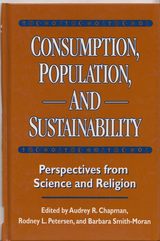
Developments in biotechnology, such as cloning and the decoding of the human genome, are generating questions and choices that traditionally have fallen within the realm of religion and philosophy: the definition of human life, human vs. divine control of nature, the relationship between human and non-human life, and the intentional manipulation of the mechanisms of life and death.
In Claiming Power over Life, eight contributors challenge policymakers to recognize the value of religious views on biotechnology and discuss how best to integrate the wisdom of the Christian and Jewish traditions into public policy debates. Arguing that civic discourse on the subject has been impoverished by an inability to accommodate religious insights productively, they identify the ways in which religious thought can contribute to policymaking. Likewise, the authors challenge religious leaders and scholars to learn about biotechnology, address the central issues it raises, and participate constructively in the moral debates it engenders.
The book will be of value to policymakers, religious leaders, ethicists, and all those interested in issues surrounding the intersection of religion and biotechnology policy.

The combined contributions of science and religion to resolving environmental problems are far greater than each could offer working in isolation. Scientific findings are central to understanding the impact of human populations on the environment, but a more ecologically sustainable future will require radical changes in values, lifestyle choices, and consumption patterns -- a revolution that falls squarely within the domain of the religious community.
Consumption, Population, and Sustainability is an outgrowth of a conference sponsored jointly by the Boston Theological Institute and the American Association for the Advancement of Science that brought together more than 250 scientists and people of religious faith to discuss the environmental impact of consumption patterns and population trends, and to consider alternative and more equitable value systems, economic arrangements, and technologies that will be necessary for achieving a more sustainable future. The book:
- provides a brief history of the dialogue between science and religion on environmental issues
- outlines potential contributions of the religious community to the debate about global sustainability
- offers a science-based assessment of issues such as carrying capacity, sustainability indicators, and the environmental impacts of consumer-based lifestyles
- considers religious and theological perspectives on consumption and population from a variety of viewpoints including Roman Catholic, Jewish, Greek Orthodox, and Islamic
- examines the ethical and policy dimensions of reorienting today's consumer society to one more focused on values, spiritual growth, and relationships.
Both the scientific and religious communities can make important contributions to understanding and responding to the impact of population growth and consumption patterns on environmental sustainability. This volume represents a significant step in establishing an ongoing dialogue between the communities, and provides a thought-provoking overview of the issues for scientists, theologians, and anyone concerned with the future of global sustainability.

Arguing that health care should be a human right rather than a commodity, the distinguished contributors to this volume call for a new social covenant establishing a right to a standard of health care consistent with society's level of resources. By linking rights with limits, they offer a framework for seeking national consensus on a cost-conscious standard of universal medical care. The authors identify the policy implications of recognizing and implementing such a right and develop specific criteria to measure the success of health care reform from a human rights perspective.
Health Care Reform also offers specific and timely criticism of managed competition and its offspring, the Clinton plan for health care reform. Because health care reform will inevitably be an ongoing process of assessment and revision—especially since managed competition has not been implemented elsewhere—this book will last beyond the moment by providing vital standards to guide the future evolution of the health care system.
READERS
Browse our collection.
PUBLISHERS
See BiblioVault's publisher services.
STUDENT SERVICES
Files for college accessibility offices.
UChicago Accessibility Resources
home | accessibility | search | about | contact us
BiblioVault ® 2001 - 2024
The University of Chicago Press









